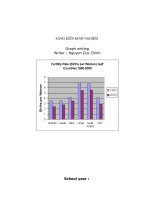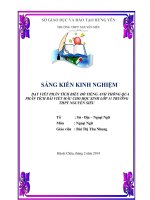skkn anh viết vẽ theo biểu đồ
Bạn đang xem bản rút gọn của tài liệu. Xem và tải ngay bản đầy đủ của tài liệu tại đây (253.47 KB, 11 trang )
S¸ng kiÕn kinh nghiÖm
Graph writing
Writer : Nguyen Duc Chinh
School year :
I. Prteface
Most Vietnamese students find writing graph difficult , especially
the students who use the old text book , because they are not
taught how to write . As a result , only the best students who
attend the contests can write , but sometimes , not very sound .
This year, the 10th students who use the new textbook , are
being taught how to write . The number of lessons for teaching
writing ,according to the cirriculum , is not enough. So to help
students , and the teachers have some more knowledge , I take
some material from the Net , and hope that it wil bring you some
profit .
II. Content
1. How to Write a graph .
In general , you can organize your writing in four or 3 or 4
paragraphs . If you write in 3 paragraphs , you should put the
paragraph 2 and 3 into one paragraph ( It is considered the body
of the graph ) , but people often organize their interpretation in 4
paragraphs . When divided into 4 paragraphs , your writing will
be clear and easy to follow .
1. Paragraph 1
• Identify if the "picture" is a bar graph, line graph, pie chart, table or
chart. (This is done in the opening sentence.)
• Copy out the main part of the question.
• "Tell" about the graphs. (What does it show?)
2. Paragraph 2
• What are the comparisons? (Things that are the same.)
OR
• What are the causes?
• You can simply copy out percentages (%) if shown.
3. Paragraph 3
• What are the contrasts? (Things that are different.)
OR
• What are the effects?
• You can simply copy out percentages if shown.
4. Paragraph 4
• What is your opinion about the causes/effects (comparisons/contrasts)
after analysing (looking at and thinking about) the data (information)?
• Write a conclusion.
2. The structures are used to write a graph .
The
bar
graph
line
graph
pie
graph
state(s)
show(s)
tell(s)
suggest(s)
that
the results of
The
figures
numbers
There was a
(adjective +
noun)
small
slight
slow
steady
sharp
sudden
rapid
increase
decrease
rise
fall
The numbers
(verb and
adverb)
increased
decreased
doubled
tripled
rose
fell
steeply
suddenly
rapidly
slowly
steadily
normally
gradually
increased
decreased
remained the
same
fluctuated
The numbers
increased
by
10%
from
10%
to
20%
This is
caused by
due to
an increase in
a decrease
A is
bigger than
more expensive
than
cheaper than
much smaller
than
slightly larger
than
B
The main difference between A and B is
In conclusion
To conclude
In summary
To sum up
As a result
3. Some kinds of graphs
There are many kinds of graphs such as : bar chart, line chart,
pie chart, table In general the layout is the same . The
language there is usually passive and comparative .
a/ Example of the bar chart
Bar Chart: Juice Exporters
The chart shows the major exporters of fruit juice in 2002. This
type of graph, called a stacked column in Excel, is not usually
recommended, but in this case it is fairly clear.
Try to answer the questions below.
NFC juice is orange juice which is NOT made from concentrate.
The juice is packed specially and no water is added. It is usually
better quality and more expensive.
FCOJ is orange juice that has been made into a concentrate.
Usually most cheap orange juice has the water removed in the
country where the oranges are grown. This leaves a concentrate,
which is frozen and exported to another country, where the water
is added back. The quality is not as good as NFC juice.
Questions:
1. Which country is the biggest exporter of apple juice?
2. Which country is the biggest exporter of orange juice?
3. What is Poland's main juice export?
4. What TWO juices does Argentina export?
5. What was the total value of all orange juice exported in
2002?
6. What is the second most important juice exported
worldwide?
7. Which TWO countries produce more than three-quarters of
the world's orange juice?
8. The bulk of the world's grapefruit juice comes from which
country?
9. Is the European Union (EU) a significant producer of
grapefruit juice?
10. How much is China's apple juice production worth in US
Dollars, approximately? $_______?
Sample answer .
Bar Chart: Juice Exporters: Suggested Answer
The bar chart shows the value of international exports of four
juices - orange, apple, grape and grapefruit – in 2002. Overall,
orange juice, whether in concentrate or non-concentrate form, is
the most important juice traded globally.
Orange juice is a very valuable commodity. Exports of
concentrated orange juice and non concentrated juice totaled
approximately $1600 million. This amount is almost twice the
value of all other juices together. Three quarters of this juice is
produced in Brazil, which is the biggest producer, and the US.
The second biggest exported juice is apple. This is produced in
China, Poland, the European Union, and other countries. Apple
juice sales constituted $600 million dollars a year, with the
biggest producer, China, accounting for about one-third of this.
The remaining juices in the chart are grapefruit, which is
produced mainly in the USA, and grape juice, which is exported
by the US, the European Union and Argentina, among other
countries. The sales of these juices are worth $100 million and
$200 million respectively.
In conclusion, it is clear that orange juice is by far the most
valuable export, but other kinds of juices represent significant
income for exporters.
b/ Example of the line chart
New Zealand Wool Price
Gapfill exercise
Enter your answers in the gaps. When you have entered all the
answers, click on the "Check" button.
a peak of fluctuated leveled off rising rose by
sharp increase was
In 1980, the price of New Zealand's wool [Clue?] $1.98 per
kilo. It then [Clue?] 20 cents in 1981 before falling back to
$1.37 in 1986. There was a [Clue?] over the next two
years, with the price of wool reaching [Clue?] $5.13 in
1988. From 1989 to 1993 the price [Clue?] between a
high of $3.20 and a low of $2.75, before [Clue?] to $4.60 in
1995. After falling again to $3.60 in 1998, the price
[Clue?] at $3.55 in 2000.
Age of Marriage
The graph shows changes in the average age of marriage for men
and women in the US in the last century.
Describe the graph in two paragraphs (one for men, one for
women) using simple vocabulary (rose by/rose to, climbed,
increased, went up. fell slightly, dropped, decreased).
c/ Example of the pie chart
Single Pie Chart
Paragraph 1
Describe what sort of chart it is and what it is about.
Paragraph 2
Describe the sections of the graph starting with the biggest and
working your way down.
Paragraph 3
A short conclusion giving an overall view of what the chart is
about. See the model answer of ‘How Americans Spend their
Money'
Two Pie Charts
If you have 2 pie charts they will be giving similar information so
you can compare the two. This type of writing is similar to a
compare and contrast essay.
Paragraph 1
Explain that they are pie charts and say what they are describing.
This is the same as line graphs except there are 2.
Paragraph 2
Compare the data between the two charts. Start with the biggest
sectors and work your way down.
Paragraph 3
Conclusion. Mention the important similarities and differences.
Look at the example for ‘Electrical Energy Production’
Means of Communication
Write 150 words describing the information in the graph below.
Suggested answer:
The two pie charts illustrate preferred modes of communication
for six forms of media in a survey undertaken in two HD 2
classes, one male and the other female, at ADWC in February
2005. A brief description follows.
First, the telephone emerges as the most popular mode for males
with a proportion of 27%. It ranks almost as high, at 22% with
females, but is tied in their case with text messaging. Text
messaging also ranks high with men, who allot it 1% more. E-
mail and instant messenger are close thirds and fourths in
popularity, scoring 17% and 16% respectively for men, 21% and
18% for their counterparts. Last, male students give the fax only
10%, and letters even less, 7%; females reverse the same
percentages.
To conclude, preferences for the six modes of communication are
almost identical for the sexes. Both favour communicating by
telephone and text message the most, e-mail and instant
messenger the second most, and letter and fax the least. The
only minor difference is that women prefer communicating by
letter and men by fax.
Word count: 179
III Feed back
Afer a year of using the above material , I can see that students
are able to write the graphs much better . I do not see any
drawbacks of the material . I hop to receive any opinion
contributed to my experience . Thanks in advance .
Lao Cai 9th September , 2007
Writer : Nguyen Duc Chinh









